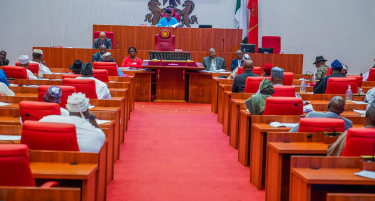In a significant legislative development, the Senate has approved a supplementary budget of N98.5 billion for the Federal Capital Territory Administration (FCTA) for the year 2024. This approval was announced by Senate President Godswill Akpabio during a plenary session held today. The passage of the supplementary budget followed the consideration and adoption of a report presented by the Committee on the Federal Capital Territory (FCT), chaired by Senator Mohammed Ibrahim, who represents Yobe South.
The session was not without its moments of contention. Prior to the report’s consideration, Senator Ireti Kingibe raised a point of order to formally express her dissatisfaction with her exclusion from the committee’s activities. As a member of the FCT Committee, Kingibe’s complaint underscored issues of inclusivity and transparency within the committee’s operations. Senate President Akpabio acknowledged her point of order, advising her to follow procedural rules by officially communicating her grievances and presenting them to the Senate through a formal motion.
The supplementary budget bill had previously been passed by the House of Representatives in the preceding week, marking a key step in its legislative journey. The bill’s progression through both houses of the National Assembly highlights its importance and urgency.
The supplementary budget, as articulated by President Bola Tinubu, is aimed at addressing critical infrastructure needs within the nation’s capital that were not included in the original 2024 budget. President Tinubu had recently presented the bill to the parliament, emphasizing the necessity of these funds to ensure the continued development and maintenance of essential infrastructure in Abuja. His reminder to lawmakers about the urgent need for these funds underscores the administration’s commitment to enhancing the Federal Capital Territory’s infrastructure.
The approval of this supplementary budget is poised to have a significant impact on the FCTA’s capacity to undertake and complete key projects. These projects are expected to address infrastructural deficits, improve public services, and enhance the overall quality of life for residents of the nation’s capital. The funds are likely to be allocated to various sectors, including transportation, healthcare, education, and housing, which are critical for the sustainable development of the Federal Capital Territory.

Senate President Akpabio’s announcement of the budget’s passage marks a crucial step in the legislative process, paving the way for the executive branch to allocate and disburse the funds as outlined. The cooperation between the legislative and executive branches in this context reflects a concerted effort to address pressing infrastructural needs and demonstrates the government’s responsiveness to the demands of urban development and governance.
The inclusion of all committee members in future deliberations, as highlighted by Senator Kingibe’s intervention, will be essential to maintaining transparency and ensuring that diverse perspectives are considered in the decision-making process. This incident serves as a reminder of the importance of inclusive governance and the need for effective communication among lawmakers.
In summary, the Senate’s passage of the N98.5 billion supplementary budget for the FCTA is a landmark decision aimed at bolstering the infrastructural framework of Abuja. It underscores the federal government’s dedication to addressing critical developmental challenges and enhancing the living conditions of its citizens. As the implementation phase begins, all eyes will be on the FCTA to see how effectively these additional funds are utilized to meet the capital’s infrastructural needs.




